ROSH HASHANAH 2005/5766
Perhaps the most often repeated word in the Torah and for sure in the prayer book is the word “blessed.” During these Days of Awe we will take stock of our blessings and our challenges both as individuals and as members of this community. Permit me to identify some of our blessings.
We are blessed by the addition of Rabbi Carey Brown and Cantor Robbie Solomon to our community. They have joined Rabbi Jaffe, one of the most beloved rabbis in the country, and together they will bless us with the combination of warmth, intellect, and spiritual inspiration that this congregation so richly deserves.
We are blessed by all those who give of their time and their money to sustain our congregation. Many will have visible roles during the High Holy Days. They include our volunteer choir accompanied and conducted by Rob Humphreville, our ushers, our child-care team, and those who will be honored with aliyot in recognition of their yearlong service. Others will not be on the bima but their service to us is no less valuable. They may be sitting right next to you. They include those who are members of our board, those who tend our gardens, those who help us mourn and memorialize our departed loved ones, those who provide rides for shut-ins, those who organize our onegs, those who publish our Bulletin and electronic media and who edit my words, those who welcome new members, those who manage our fundraising efforts, and those who perform tasks without being asked, often anonymously and often without formal recognition. Thanks to all of you from the bottom of my heart. You are a blessing to our congregation and you make my job a blessing.
We are blessed to have Rabbi Michael Swarttz as our Director of Education and further blessed by our school’s dedicated administrators, educators and teachers. We are blessed by Betsy Herman, our Administrative Director, and her team of office and custodial workers.
Finally, we are blessed by your presence here today—each one of you. The congregation of Temple Isaiah is the brightest, kindest, most forgiving, most accomplished and most accommodating congregation one could ever hope for. Thank you for your generosity, for the depth of your character and for the sweetness of your disposition. You make my job a true labor of love.
Each temple president is granted two opportunities to address the entire congregation in the large room with the walls down. This is my second and final opportunity, and I know I speak for all past presidents when I say that addressing you on the High Holy Days is a responsibility of awesome magnitude and an honor of unimaginable dimension. My term of office will last until next June, and today begins the push to complete initiatives begun last year, to introduce new programs that might take hold, and to hand off to my successor a temple that is robust and sound. I remain eternally grateful for the opportunity you have granted me and am happy to present to you four of our many initiatives for this New Year.
Worship
Worship is our number one priority for this year and for years to come. The congregational survey demonstrated that worship matters deeply to you. While in many synagogues, activities in the sanctuary are incidental to the programming and educational activities that occur elsewhere in the building, our congregants say otherwise. What happens in this sanctuary before the ark remains your highest priority. Bringing a cantor to Temple Isaiah clearly demonstrated the board’s intention to put worship first. But welcoming a cantor is not enough. Replacing our tattered Shabbat siddur, which we will do later this year, is not enough. Learning directly from you about your worship needs and responding appropriately is what we must do.
That conversation began last year with a simple question: “Should the Kolin Torah processional be short or long?” Your commentary revealed the depths of your passion about the sacred Torah and the way it is revealed to you. Now we must provide you with worship that, like the Torah processional, is both intimate and inspiring. To do that, we need to continue the conversation. Our Worship and Strategic Planning Committees are crafting open worship forums and surveys. Please attend and please make your voices heard. However, don’t wait to be asked. Please accept my invitation today to attend Shabbat Services regularly. Please give Shabbat a new chance. Each Shabbat experience is unique and a product of the combined energy of those on the bima with those of you facing the ark. Simply by attending, you will mold the worship experience to suit your needs. We are listening to and learning from you. The sanctity and success of this space depends upon your participation.
Social Action
The Social Action Committee’s response to the crises in the Gulf States is a model of inspired, intelligent Tikun Olam. We are all proud of what they have accomplished on our behalf. Temple Isaiah is distinguished by the hard work of the members of this committee. Their Synagogue Organizing Project began as an experiment in community engagement and has become a dynamic force energizing hundreds of congregants around issues that our community holds dear. The three issues for community involvement are health care, interfaith relations, and the impact of the state economy upon us all. The action teams are now meeting to plan strategy, but there is still time for you to join in.
Israel Action
Our Israel Action Committee truly reflects the core values of our community. It doesn’t preach blind devotion or unquestioning alignment. Instead it presents programs that explore the complex social, religious, and geopolitical aspects of life in Israel today. In so doing, it promotes an Isaiah community that is engaged, educated, and thoroughly committed to Israel’s survival. After Gaza: Looking Ahead, a program they are planning for Sunday, October 23 will explore the future implications of the Gaza disengagement program. Please attend and get engaged.
Leadership
While our synagogue has skilled clergy and professional staff hired to design our programming and guide the institution, a huge percentage of the leading and managing is left to the volunteer laity. We can choose to function as amateurs, or we can educate ourselves and construct a governing body that reflects our highest personal standards and meets the very lofty expectations of our community. For nearly fifty years the congregants of Temple Isaiah have chosen the latter.
This year we will unveil a new Temple Isaiah Board, restructured and reinvigorated. To those of you who have regretted that you are not part of our temple’s leadership, there will be a place for you in the boardroom of tomorrow. At the November 13th Congregational meeting, we will unveil the new board for your approval, and later in the year we will seek participants for leadership training so that you can be part of the board for Isaiah’s next fifty years. Please attend in November.
Last year at this time I spoke of ownership—the ownership of one’s place of worship and the responsibilities and opportunities that can ensue. Yet, as empowering a concept as ownership is, it may not go far enough to encompass fully and describe accurately the ideal relationship between an individual and his or her religious community.
From last Rosh Hashanah until today, I have seen many examples of poor ownership. There are absentee owners who neglect their properties, inhumane owners who abuse and torture their pets, irresponsible owners who operate their vehicles and fire arms in a reckless manner, and American voters and elected officials who shirk their ethical obligations by not maintaining our infrastructure, gambling that the “big one” will come on someone else’s watch or will land in someone else’s back yard. A certificate of ownership by itself is not a guarantee that the holder of that deed is a true steward of his property.
Perhaps we should speak of stewardship, not ownership, when we refer to the ideal relationship between the congregation and its synagogue. We have a word for that kind of Jewish stewardship. We call it a sacred covenant or brit.
Schmuel Yosef Agnon [Wikipedia], the first Hebrew author to win the Nobel Prize in literature was born in Buczacz (Buchach), Galicia, now Ukraine, in 1888 and died in Jerusalem in 1970. He amassed a considerable volume of work in his lifetime, and in his anthology Ir Umloach, The City and the Fullness Thereof, he immortalized the city of his birth and the shul in which he worshiped and studied.
The shul in Buczacz was a model of religious stewardship. Those who worked for it did so without remuneration, and religious services were provided free to all. Everyone was a member—no one was unaffiliated. If asked to describe the relationship between his townspeople and their shul, Agnon would not speak in terms of dues, fund-raising, building campaigns, salaries, or any of the words we associate with modern synagogue management. Instead he would describe an organic relationship born of years of interdependence, suffering, celebrating, building and rebuilding.
Much has changed in the century since Agnon’s birth. Secular and Jewish organizations alike compete for the affection of the American Jew. Jews question the need to affiliate with synagogues, and lifetime affiliation is rare. Synagogues around the country struggle for membership, for funds, and for stable leadership. At Temple Isaiah we are quite fortunate in that we maintain a sound and stable membership, solid fiscal policy, and a committed core of lay and professional synagogue stewards who safeguard our place of worship. But it doesn’t come easily, and we too struggle with all the problems common to our sister congregations.
In this room today, there will be nearly two thousand people celebrating our New Year. If a visitor from Buczacz were here today and asked what is our relationship with this place, what would you say? How do we compare to the Jews of Agnon’s hometown? This is what I would tell him about us.
Some here are guests, and we open our arms to them and welcome them to our communal home.
Others are non-members who somehow secured a ticket to gain entry so they could hear the plaintive call of the Shofar one more time. I know them; I was once with them. We embrace them and urge them to tarry a bit longer than they intended.
Some are here for a self-limited period of time—perhaps long enough to secure a certificate of Bar or Bat Mitzvah for their children. That’s why I joined. To them I would plead that a longer-term stay might reap rewards far higher than they originally imagined.
Others reflect American consumer thinking and wish to pay only for services requested. I would ask them to consider that while most things have a price, and certainly synagogue offerings are expensive, sacred moments and the bonds of friendship created in this place are truly priceless and often occur when you least expect them. And for those truly in need, we offer ourselves for little or no cost.
Some have philanthropic zeal and are generous to our synagogue, and we applaud their tzedekah. But we have not forged a strong enough partnership with them, and that is our fault. We promise to communicate with them more faithfully in the future while showing enhanced appreciation for what they did for us in the past. There is a place of honor within these walls and upon these walls for the tzedeks among us, if they wish it.
Many feel love for their temple. They see the building, the Torah, and the people within as seamless extensions of themselves and their heritage. The life that goes on inside these walls nurtures them, comforts and protects them, excites and uplifts them; and when they have been away for some time, they yearn to return to see familiar faces, to hear uplifting sounds, and to relive sacred moments. I know them too, and I hope they include me amongst them. They are the soul of this sacred place.
And finally, others escape categorization. They are never satisfied with how much they do. They perform multiple roles, always adapting and growing, supporting and generously nurturing no matter how much we ask of them. They recognize the unique role this synagogue plays in our community and our culture and are determined to insure its survival for their children’s children. I thank God for them. I aspire to be one of them. They are the foundation of our temple.
The visitor from Buczacz then asked, “Are these all the Jews?” “No, there are others not here today or most any day. These absent Jews assume that our shul and our culture will be here for them when and if they choose to participate, for they expect that others will sustain it.” The visitor then said, “Let them speak to Schmuel Agnon who left his shul and his neighbors for Israel assuming they would all be there to embrace him upon his return.” In his story, The Sign, Agnon weeps tears of remorse for his lost shul and community, all obliterated in the holocaust while he was absent.
If I have oversimplified your relationship to our temple or characterized it in a way that causes you distress, please forgive me, for my intent was not to insult but to challenge commonly held assumptions of synagogue commitment and to promote an enhanced relationship between the Jews of our towns and their shul. I want you to know what a wonderful and fragile jewel we have here and how much it needs you to sustain it.
I urge those of you who seek greater fulfillment in your lives to explore the possibility that a synagogue can fill a void unfilled by work, charities, social service agencies, and political and cultural organizations. No other entity be it CJP, your local country club, the symphony, or the myriad of good causes both Jewish and secular promises to embrace you from cradle to grave irrespective of your wealth, your pedigree, or the number of degrees after your name and then do the same for your descendants until the end of time. I hope each of you will choose to become stewards of our temple.
~ ~
In closing, I would like to offer you favorite words of mine from Devarim, Deuteronomy 28. I heard them first as a child from the rabbi of my youth, Joseph Sternstein, and heard them again from the first rabbi of my adult life, Cary Yales of blessed memory. Perhaps you too have been touched by them.
May we be blessed in our comings in; may we be blessed in our goings out from this our sacred place.
On behalf of the Board of Trustees, on behalf of my family and me, may our synagogue shelter us from all of life’s storms, those from within and those from without, may we be loving stewards to each other, and may we all be inscribed in the Book of Life and health and happiness for another year of blessings.
L’Shana Tova
Robert Atkind
President, Temple Isaiah





